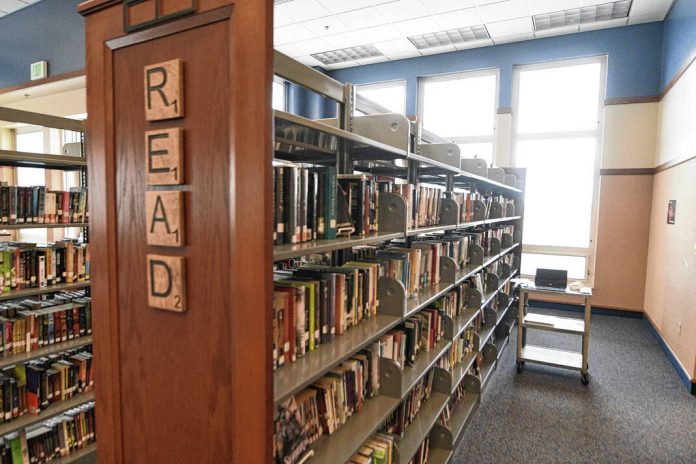A new Indiana law requires school officials to allow parents to challenge library materials, but local schools already have similar processes in place.
The legislation, however, allows legal action against schools that don’t follow the law.
House Bill 1447, which Gov. Eric Holcomb signed into law earlier this month, goes into effect July 1 and affects public and charter schools. It requires school libraries publicly share their catalogs and allows parents to challenge books they find “obscene” or “harmful to minors,” according to the bill.
The bill was hotly contested by school librarians and people concerned with censorship during hearings on the bill at the Statehouse. Critics argued the bill could have a “chilling effect” on book selections, and could put books about LGBTQ+ youth and sexual education on the chopping block.
School board members must review the challenged books during the first public meeting following the parent’s request, but the law creates an appeals process for school board members who disagree with the challenge. The law removes language that would allow school officials and board members to claim “educational purposes” as a legal defense to keep books on shelves. They can be charged with a felony if they break the law, according to an article from the Indiana Capital Chronicle.
At local schools, however, there are already systems in place for parents to challenge reading materials. During the 2021-22 school year, Clark-Pleasant Community School Corporation officials decided to remove “l8r, g8r,” by Lauren Myracle from shelves. A committee of staff members, administrators and parent teacher organization representatives determined the book had substandard literary quality and a lack of student interest, spokesperson Rick Hightower said.
The school district has a school board policy, adopted May 18, 2021, that allows any Clark-Pleasant parent or guardian to inspect any non-academic student materials and file a complaint if they find objectionable material, according to school district documents.
Franklin Community School Corporation has a similar policy. Last year, a book review committee decided to remove “Tricks,” by Ellen Hopkins.
“Tricks” contained an “extremely intense, gritty look at teen prostitutes,” and “committee members who read the book struggled to find the overall message,” the committee said in its recommendation for the book’s removal. “Those who read the novel the novel felt it contained graphic descriptions of sexual activity among teens.”
For Franklin schools, administrators will need to sort out any ambiguities and make sure the procedures followed by school officials meet the law’s requirements, said Brooke Worland, assistant superintendent.
“We have to make sure the law aligns with our policy and see if we need to change how families contest a book,” Worland said.
Superintendent Tim Edsell said administrators from Indian Creek schools will make sure to update the school policy to be compliant with the new law, while Greenwood and Center Grove administrators are waiting for more guidance from the Indiana Department of Education before taking action, school officials said.
“They passed the law, and then the guidance comes out,” Greenwood Superintendent Terry Terhune said. “We understand they want to protect our kids but we also want to make sure it’s balanced with what’s appropriate for each age level and what’s not appropriate, and what can help them grow.”
Edinburgh Community School Corporation officials developed an appeals policy last year, with a committee of parents, teachers, library staff members and administrators to review complaints and make recommendations to Superintendent Ron Ross.
“The policy will need to be revised to include the school board in the process,” Ross said. “We will also need to post all library books on our website. This information is already in an electronic database, so it shouldn’t require a lot of extra work to get that done. I don’t see this having a major impact on what we do or what books are in our libraries.”





